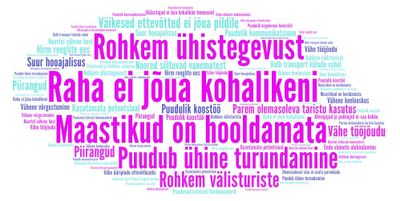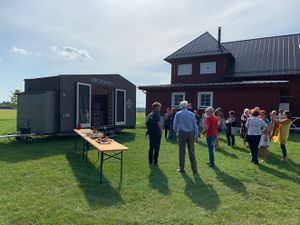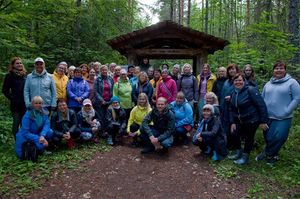Lahemaa Community Innovation Lab: Difference between revisions
No edit summary |
|||
| Line 37: | Line 37: | ||
# Seasonality | # Seasonality | ||
=== | === Workshops on Idea Implementation === | ||
During the later workshops, we took a more personalised approach and set our focus on the needs of each entrepreneur who wanted to develop an idea through the innovation lab. This then progressed on to working with entrepreneurs who wanted student help during the summer. | During the later workshops, we took a more personalised approach and set our focus on the needs of each entrepreneur who wanted to develop an idea through the innovation lab. This then progressed on to working with entrepreneurs who wanted student help during the summer. | ||
Revision as of 10:18, 29 October 2019
About the Lahemaa Community Innovation Lab
We (Roger Evans and Tarmo Pilving from EMÜ and Kaisa Linno from NGO Ökokuller) started with the community workshops in January 2019. During the winter and spring (2019) five community workshops (January-May, one workshop in each month) were conducted.
Areas of Focus
A number of challenges had previously been identified, and the decision was to develop the Lahemaa CIL to address the following challenges:
- Lack of occupational opportunities
- High seasonality
- Competition from companies that are based in Tallinn
- Restrictions on land use
- Lack of collaboration, cooperation and partnerships between state, locals and municipalities
- Lack of rural and recreational tourism coordination between different stakeholders
- High dependency on EU projects
- Local entrepreneurs lack a number of skills: online marketing, social media content creation, guiding, law, making their services suitable for different target groups etc.
Workshops
The community workshops were aimed at:
- Identifying the challenges in Lahemaa National Park
- Identifying the challenges facing local stakeholders
- Facilitating the learning process (for both community members and students of EMÜ)
- Encouraging the generation of business ideas
- Encouraging social interaction between local stakeholders and EMÜ students
- Familiarising EMÜ students with Lahemaa and the local community with the university
- Finding summer placement hosts for the students
Lahemaa Community Workshop in Kolgaküla Community House
Almost 50 local stakeholders attended the first workshop and the group consisted of mostly local micro-entrepreneurs, officials of the Environmental Board and State Forest Management Centre, a representative of the local newspaper and the head of the local government; 10 EMÜ nature tourism students were also present.
During the first workshops, local challenges were identified and grouped them into four categories:
- Marketing and local image
- Collaboration
- Workforce
- Seasonality
Workshops on Idea Implementation
During the later workshops, we took a more personalised approach and set our focus on the needs of each entrepreneur who wanted to develop an idea through the innovation lab. This then progressed on to working with entrepreneurs who wanted student help during the summer.
These enterprises are:
- Tammistu Sheep Farm: a small family farm maintaining semi-natural coastal meadows and wants to develop small-scale family tourism
- Muuksi Stable: a horse farm also focusing on family tourism
- Kärka Accommodation: home accommodation
- Viinistu Hotel: one of the largest hotels in the area that also focuses on nature tours and harbour services
- Kolga Manor: an art gallery
Lahemaa Mobile Tourism Info Cafe (LMIC)
During the 2018/2019 period, the first Estonian mobile tourism info cafe was built. The LMIC was co-created by EMÜ and NGO Ökokuller. The mobile info cafe is a place for EMÜ students in their summer placements and local youth for learning entrepreneurship. It will offer local services and products and information to Lahemaa National Park visitors. The LMIC will be fully operational in the summer of 2020.
| Services Being Developed | What the LMIC Will Deliver |
|---|---|
|
|
|
|
|
|
|
|
|
|
|
|
EMÜ Student Summer Placements
Five EMÜ students helped local entrepreneurs during the summer of 2019. They were involved in a range of tourism and business development activities including:
- Marketing
- Social media content creation
- Guiding
- Sales
- Making photos and videos
- Building
- Repairs
- Mowing
During the summer the students learned many new things including:
- In small enterprises you must do everything with your own hands
- Previous experience is extremely important
- How people behave when they are taking a tour
- People from different nationalities behave differently in nature
- Previous knowledge helps to implement ideas more quickly






